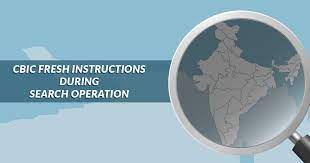GSTN : Instructions during the search operation & ITC
Page Contents
GST Instructions during the search operation:
Instructions/Guidelines for methodologies to be supported during the search operation.
- Few instances have been notified by the CBEC & Central Vigilance Commission where the correct process has evidently not been tried to follow during the search procedure and or the statements /Panchnamas have not been recorded in accordance with the present guidelines.
- Such inconsistencies weaken the judicial review of the case at a later stage.
- instructions contained in the Central Excise Intelligence and Investigation Manual (2004), which are valid even under the GST regime, are reiterated for compliance by DGGI/filed formations.
- Even more inquiries on the subject are in the process
What has been the GST Practice till now?
- Before completing the form 9/9C, CAs/CWAs have a common practice of verifying and validating all documents, including returns and books of accounts.
- Cost Accountants or CAs used to verify for any compliance issues and ensure that the correct data was uploaded to each column.
- CAs/CWAs have also been extra cautious when writing reasons for unreconciled returns disparities.
- The most notable benefit of these methods has been the ability to detect errors in a company’s data before they are discovered by the Department.
- Professionals have been taking care of these errors, ensuring that businesses will not suffer problems as a result of them in the future.
You can also read: GST Return compliances calendar- Nov 2020
We can understand The GST Issues with the help of below example
- For the majority of their expenses and sales, many firms still use cash.
- These businesses deposit the money earned from sales into their bank accounts and pay GST on the amount earned.
- Even when the Department requires it, these enterprises frequently fail to generate the E-way Bill.
- Over the audit, the Indian Chartered Accountants detects these errors and assists the company in correcting the errors created during that time period.
- Chartered Accountants also instructs management on how to avoid making similar mistakes in the future.
- The Chartered Accountants, for example, teaches management on a variety of topics, including the following:
-
- It is not an incorrect practice to allow the delivery of goods to a company that is not registered in GST. The unregistered party can also opt for self-delivery however they cannot generate an E-Way Bill.
- In case, generation of E-Way Bill is mandatory for particular movement, then generated by registered seller himself.
- As per Rule 46 of CGST Rules 2017, the Cash Memo must contain the name and address of the party buying the goods in cash if the invoice amount exceeds Rs 50000/-.
-
-
- There are other linked rules that you have to take care of. As per the Income Tax Rules, you as a business cannot sell more than Rs. 2 Lakhs worth of goods or services in cash in a day. At the same time, a business cannot buy more than Rs. 20,000 worth of goods or services in cash in a day.
- The rules of GST and Income Tax are different, but you have to take care of the compliance of both the Govt. bodies at the same time.
-
-
- The practicing Chartered Accountants would also do a comparative review of the total cash memos and the amount of money deposited in the bank. Further also verify whether GSTR 1 properly filled up or not.
- You are not required to explain these scenarios in GSTR 9C; however, the Department can send a notice after identifying mistakes as per these rules.
- You’ll then have to submit an explanation along with corroborative evidence to avoid penalties and numerous other problems.
GSTN has issued an Advisory dated October 17, 2021 for taxpayers regarding the availability of ITC for FY 2020-21.
1.According to Section 16(4) of CGST Act, 2017, No taxpayer shall take input tax credit in respect invoice or debit notes Records for supply of goods or services (or both) for FY 2020-21 after the due date of furnishing the return for the month of Sept 2021.
Timeline for the GSTR-3B for Sept 2021 is either 20th Oct 2021 for monthly filers and 22nd or 24th Oct 2021 depending on the State/UT of registration of the taxpayer. With reference to above contains, the below may kindly be noted:
i.) invoice or debit notes Records pertaining to FY 2020-21 reported in GSTR-1 after due date of GSTR-3B of September 2021 will not reflect as “Input Tax Credit Available” in GSTR-2B of the recipients. Such records will reflect in “ITC Not Available” section of GSTR-2B and such Input Tax Credit shall in turn not be auto-populated in GSTR-3B.
ii.) invoice or debit notes Records pertaining to FY 2020-21 reported in GSTR-1 after due date of GSTR-3B of Sept 2021 will also not reflect as “Input Tax Credit as per GSTR-2A” in Table-8A of GSTR-9 of the recipients.
2.It is requested that the taxpayers may take note of the above and ensure that their records pertaining to FY 2020-21 are reported on or before the due date of their GSTR-3B for the month Sept 2021, or for the quarter of July to Sept 2021 in case of quarterly GSTR-3B filers.
Availment of Input Tax Credit by the recipients contrary to the legal provisions in GST may entail action by the tax administrations in accordance with law.
Popular Articles:

